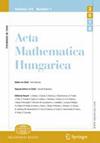On reciprocal sums of infinitely many arithmetic progressions with increasing prime power moduli
IF 0.6
3区 数学
Q3 MATHEMATICS
引用次数: 0
Abstract
Numbers of the form \(k\cdot p^n+1\) with the restriction \(k < p^n\) are called generalized Proth numbers. For a fixed prime p we denote them by \(\mathcal{T}_p\). The underlying structure of \(\mathcal{T}_2\) (Proth numbers) was investigated in [2]. In this paper the authors extend their results to all primes. An efficiently computable upper bound for the reciprocal sum of primes in \(\mathcal{T}_p\) is presented. All formulae were implemented and verified by the PARI/GP computer algebra system. We show that the asymptotic density of \( \bigcup_{p\in \mathcal{P}} \mathcal{T}_p\) is \(\log 2\).
论素数幂模递增的无穷多个算术级数的倒数和
形式为 \(k\cdot p^n+1\) 并带有限制条件 \(k < p^n\) 的数被称为广义普罗斯数。对于固定的素数 p,我们用 \(\mathcal{T}_p\) 表示它们。2] 中研究了 \(\mathcal{T}_2\)(普罗斯数)的基本结构。在本文中,作者将他们的结果扩展到了所有素数。本文提出了一个可有效计算的 \(\mathcal{T}_p\) 中素数倒数和的上界。所有公式都是通过 PARI/GP 计算机代数系统实现和验证的。我们证明了 \( \bigcup_{p\in \mathcal{P}} \mathcal{T}_p\) 的渐近密度是 \(\log 2\).
本文章由计算机程序翻译,如有差异,请以英文原文为准。
求助全文
约1分钟内获得全文
求助全文
来源期刊
CiteScore
1.50
自引率
11.10%
发文量
77
审稿时长
4-8 weeks
期刊介绍:
Acta Mathematica Hungarica is devoted to publishing research articles of top quality in all areas of pure and applied mathematics as well as in theoretical computer science. The journal is published yearly in three volumes (two issues per volume, in total 6 issues) in both print and electronic formats. Acta Mathematica Hungarica (formerly Acta Mathematica Academiae Scientiarum Hungaricae) was founded in 1950 by the Hungarian Academy of Sciences.

 求助内容:
求助内容: 应助结果提醒方式:
应助结果提醒方式:


